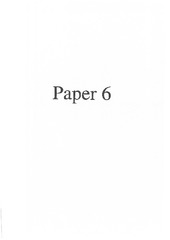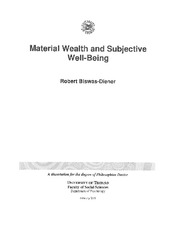| dc.description.abstract | People have long argued over the relation of income and material well-being to happiness. A variety of studies have examined the happiness of those living at the lowest economic levels as well as those living in relatively affluent nations. Taken together, this body of research suggests that income is correlated with subjective well-being (SWB), but is neither the most important factor in happiness, nor is this relationship unmediated or context free. The studies in the current dissertation outline a new approach to material wealth and SWB that proposes that there is much to learn about the money-happiness relationship by looking at the emotional lives of the very poor and the relatively affluent. Studies from the poor suggest that a lack of economic stability creates psychological risk factors for people, but that surprisingly high levels of emotional flourishing can still be found in impoverished communities. This latter finding suggests we need further research to determine how "basic" are basic needs. By contrast, research with people from relatively affluent nations suggests that income beyond the basic needs level can provide additional SWB, and that specific cultural context and personal aspirations mediate this relationship. Implications for policy and intervention are discussed. | en |
| dc.description | This is a Dr. Philos. thesis.
<br><br>The papers number 1-4 of the thesis are not available in Munin due to publishers' restrictions:
<br>1. Diener, E. & Biswas-Diener, R. (2002): 'Will money increase subjective well-being? A literature review and guide to needed research.' Social Indicators Research, Vol 57, No 2, 119-169 (Springer). Available at <a href=http://dx.doi.org/10.1023/A:1014411319119>http://dx.doi.org/10.1023/A:1014411319119</a>
<br>2. Biswas-Diener, R., Vitterso, J., & Diener, E. (2005): 'Most people are pretty happy, but there is a cultural variation: The Inughuit, the Amish, and the Maasai.' Journal of Happiness Studies, Vol 6, No 3, 205-226 (Springer). Available at <a href=http://dx.doi.org/10.1007/s10902-005-5683-8>http://dx.doi.org/10.1007/s10902-005-5683-8</a>
<br>3. Biswas-Diener, R., & Diener, E. (2001): 'Making the best of a bad situation: Satisfaction in the slums of Calcutta.' Social Indicators Research, Vol 55, No 3, 329-352 (Springer). Available at <a href=http://dx.doi.org/10.1023/A:1010905029386>http://dx.doi.org/10.1023/A:1010905029386</a>
<br>4. Biswas-Diener, R., & Diener, E. (2006): 'The subjective well-being of the homeless, and lessons for happiness.' Social Indicators Research, Vol 76, No 2, 185-205 (Springer). Available at <a href=http://dx.doi.org/10.1007/s11205-005-8671-9>http://dx.doi.org/10.1007/s11205-005-8671-9</a> | en |


 English
English norsk
norsk

